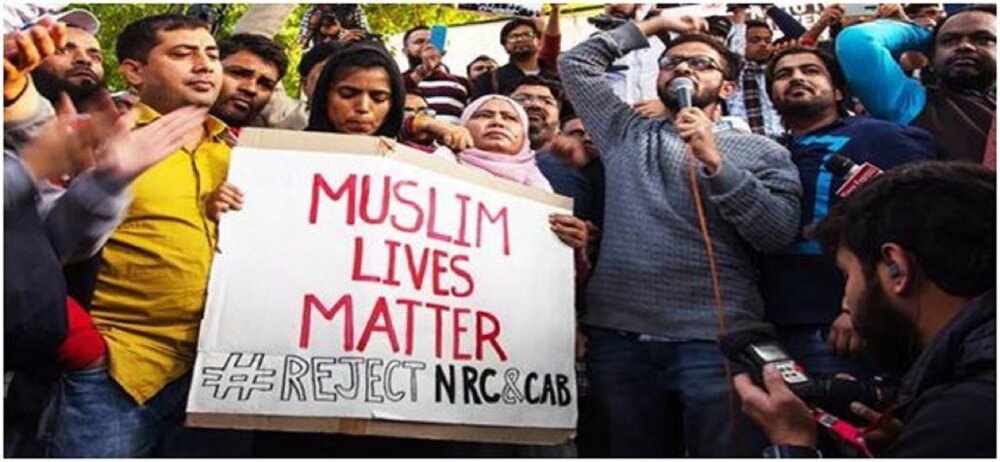Hawzah News Agency –Munawar Faruqui makes people laugh for a living, but the 29-year-old stand-up comedian has recently lost his sense of humour. It started at the beginning of the year when the son of a legislator in Prime Minister Narendra Modi’s ruling Bharatiya Janata Party (BJP) accused him of denigrating Hindu gods prior to a comedy show in the city of Indore, central Madhya Pradesh. Faruqui was promptly arrested and sent to jail, where he spent a month. From there his troubles only mounted.
Right-wing activists who provide both muscle and vocal support to Modi, have been hot on his trail, forcing him to cancel shows in city after city. Most recently, in Raipur, a date was cancelled after members of Bajrang Dal, one of the most raucous Hindutva groups, threatened violent disruption.
Faruqui is not alone in having his life turned upside down. Many others in the country - mostly Muslims - are living such nightmares. This includes a poor bangle-seller who ‘strayed’ into a Hindu neighbourhood of Indore and was accosted by religious vigilantes. Badly beaten, he was then thrown into jail on a plethora of charges by an insensitive establishment that is increasingly seen to be condoning such mob justice.
In a country as vast and populous as India, whose population is 1.3 billion, the targetting of minorities has reached alarming proportions. The actual numbers may seem small, as they are confined to double digits per year. However, they still have a chilling effect. Each incident forces the minority to further cower in fear while the perpetrators are emboldened ever more.
Taken together, these violent acts bolster an agenda of majoritarianism that the ruling BJP and its ideological fountainhead, the RSS, are pushing to impose on a country founded on the principle of unity in diversity.
At the moment, Hindutva forces that believe in the primacy of Hindus in a nation with no less than 14 percent Muslim population are enjoying free reign. At the receiving end are not just Muslims, but anyone whose language they deem does not have a place in the majority. Essentially, what is under attack is anything Islamic.
FabIndia, a popular clothing chain, had to hastily withdraw the Jashn-e-Riwaaz advertisement campaign it launched to celebrate Diwali – the Hindu festival of lights – in the face of an orchestrated outrage about its use of an Urdu phrase.
Prakash Jha, a noted filmmaker, was assaulted and his face blackened by a mob that was enraged by his upcoming web series, whose name they felt portrayed Hindus in a poor light.
But, of course, it is Muslims who are bearing the brunt of an offensive that has been gaining momentum ever since Modi rose to power in 2014 and retained it in 2019. Electoral verdicts in favour of the BJP have been interpreted as sanctioning the party’s Hindutva agenda, and that India, which prides itself for the rule of law, is sinking into lawlessness.
The targetting of racial minorities has gathered momentum and is now taking more ominous tones – both physical and psychological.
A Muslim is killed in Dadri, adjacent to Delhi, for suspected possession of beef at home; Pehlu Khan, a dairy farmer, is publicly lynched in Rajasthan for alleged cattle smuggling.
India loses a high-profile cricket match to Pakistan in the T20 World Cup and several Kashmiri students are arrested for allegedly celebrating the rival’s victory.
A prominent university of Uttar Pradesh releases a poster featuring a picture of poet Muhammad Iqbal to mark Urdu Day – the official language of Pakistan that is widely spoken in India too – but is compelled to change it and apologise. Ironically, it was Iqbal who penned the patriotic song ‘Saare Jahan Se Accha Hindustan Hamara’ (India is the best among the world) that is still played in official ceremonies with pomp and grandeur.
The unmistakable message is that India may no longer be the best place for Muslims, a group who find themselves caught in a cultural pincer grip that has been expanded on eloquently in a recent book, Born A Muslim: Some Truths About Islam in India by journalist Ghazala Wahab.
According to Wahab, India is generally suspicious of the minority community. That suspicion pushes members of this community deeper into ghettos where they can fall under the influence of conservative clerics who prey on their vulnerabilities. Without much hope for education, prosperity and assimilation, the community drifts farther away from the mainstream, and the existing cultural divide widens.
BJP’s motivation
India has a long history of communal strife. One major riot took place all the way back in 1894 in Mumbai and claimed about 100 lives. But the rapid worsening of relations in recent years is taking a bigger toll: it has tarnished India’s reputation as a beacon of tolerance in a region beset with fault lines. So why do the rulers of present-day India persist with their Hindutva agenda?
Apart from ideology, one reason could be that the demonisation of Muslims is a useful distraction for those in power. There are many things wrong with the country, including a tanking economy, growing unemployment and rising poverty. Yet many are blind to such problems and remain bound together by their mutual hatred of Muslims.
Channeling public anger in this manner can reap electoral dividends as well. Though members of a dominant religion, Hindus, who are divided into castes and sub-castes, are a disparate voting bloc. Those inherent differences, however, tend to fall by the wayside in support of the majority when religious hatred takes centrestage.
This seemed to be the case during the last state elections, which were preceded by communal tension in the bellwether state of Uttar Pradesh and ended up benefiting the BJP. Elections are due again in that state and several others next year, and we can expect more of the same. Evidently there is a method to the madness of vilifying Muslims.


Your Comment